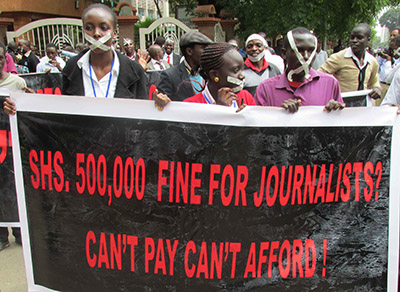Nairobi, December 5, 2013—Kenya’s National Assembly today passed contentious anti-press legislation, the Kenya Information and Communication (Amendment) Act and the Media Council Act, which will effectively silence critical reporting through a new government-controlled regulator and the threat of hefty fines.
“These media laws will force journalists and news outlets to self-censor to survive. They are a severe blow to investigative reporting in Kenya,” said CPJ East Africa Representative Tom Rhodes. “The laws also set a dangerous precedent for other East African countries which take their cue from Kenya, traditionally a regional leader in the industry.”
The Kenya Information and Communication (Amendment) Act and the Media Council Act will enable a new government-controlled regulatory board to fine journalists up to 500,000 Kenyan shillings (US$5,500) and media companies up to 20 million shillings (US$230,000) if the board finds them in breach of a government-dictated code of conduct, to be penned by legislators.
The final legislation differs little from the original passed by the National Assembly on October 31. President Uhuru Kenyatta blocked the original, but the final version, approved with his recommended changes, did not adhere to the substantial requests by the press community, according to news reports.
The laws also passed without amendments that had been agreed upon Tuesday between the Parliamentary Committee on Energy, Communication, and Information and press organizations including the Kenya Editors’ Guild and the Kenya Correspondents Association. The compromise would have eliminated hefty fines against the press and allowed the statutory Media Council of Kenya to continue self-regulation while the state-controlled Communications Authority of Kenya would contend only with infrastructure issues such as broadcast frequency assignments, according to news reports. Parliament lacked the two-thirds majority to approve the suggested amendments, local journalists told CPJ.
The bills passed despite nationwide protests by journalists on Tuesday.
A joint statement issued today by Kenya Editors’ Guild, the Kenya Correspondents Association, and the Kenya Union of Journalists characterized the law’s passage as “a dark moment for Kenya’s robust media environment” after parliament “rubber-stamped” a law that will “reverse gains made on freedom of expression and independence of media from state interference.” The Editors’ Guild plans to challenge the law’s constitutionality at the high court as well as launch new protests and engagement with the government, Guild Deputy Director David Ohito told CPJ.
Local journalists said the new law contravenes Article 34 of the constitution on media freedom that says the state cannot penalize any person for any opinion or view or the content of any broadcast, publication, or dissemination. They said the legislation is likely a reaction to critical and investigative reporting into activities of the government.
